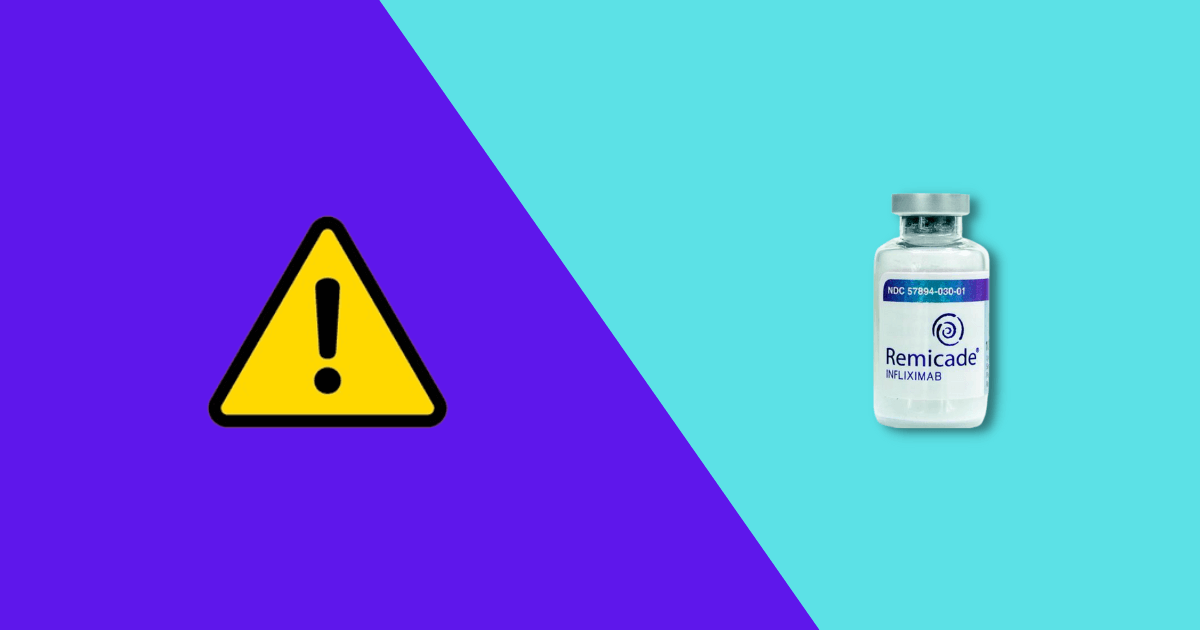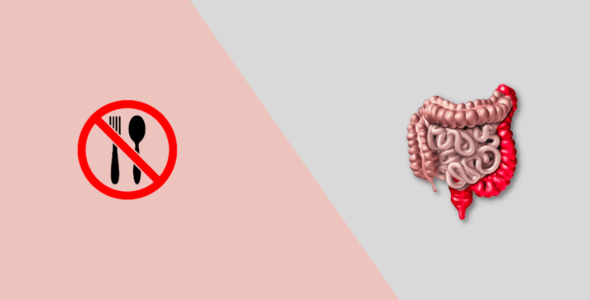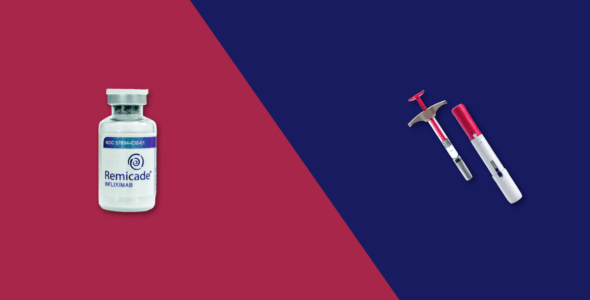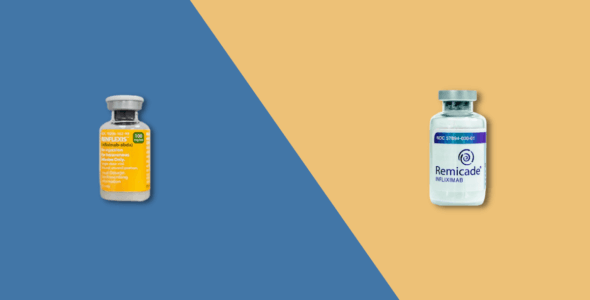Remicade side effects and how to avoid them
Table of contents
Remicade is an FDA (U.S. Food and Drug Administration) approved medication manufactured by Janssen Biotech, Inc. It is classed as a tumor necrosis factor-alpha inhibitor and is used to treat inflammatory autoimmune diseases. While Remicade is generally well tolerated, there are some potential side effects that people should be aware of. The most common side effects of Remicade include an increased risk of infections. Less common, but more serious side effects, can include kidney or liver injury.
Learn more about the side effects of Remicade and what you can do to avoid them.
What is Remicade (infliximab)?
Remicade contains infliximab as the active ingredient. It is a biologic drug made from living organisms. Remicade is used alone or in combination with methotrexate to treat inflammatory autoimmune diseases such as rheumatoid arthritis, plaque psoriasis, psoriatic arthritis, and ankylosing spondylitis. It can also be used to treat similar inflammatory conditions, such as Crohn’s disease, and ulcerative colitis.
Infliximab reduces the inflammation caused by some autoimmune and inflammatory diseases. Inflammation is a natural process your immune system uses to clear itself of infections. When your immune system detects infections, or when it accidentally attacks normal cells in your body, it releases a substance called TNF. TNF travels to the site of infection where it triggers inflammation.
Infliximab blocks this process. It binds with TNF, stopping it from working, and reducing your levels of inflammation. This can ease the symptoms of your disease, limit the damage they can cause, and reduce the severity and frequency of flare-ups.
Always check with your doctor or pharmacist before taking any medication, including Remicade, to make sure it is safe for you.
Remicade dosage
Remicade is available in lyophilized powder form, in the following doses: 100 mg in a 20 mL vial for intravenous infusion. The dose you receive will be based on your age, weight, and the condition you are being treated for.
You are advised to read the medication guide provided with this medicine for the complete drug information and always speak with your healthcare provider for medical advice about any changes to your dose so they can monitor and evaluate your condition.
Remicade side effects
The most common side effects of Remicade include:
- Stomach pain
- Nausea
- Headaches
- Higher risk of infections, such as upper respiratory (sinus infections and sore throat) and viral infections
More serious side effects of Remicade include
- Delayed allergic reactions – fever, hives, sore throat, shortness of breath, difficulty swallowing, headache, high or low blood pressure, joint or muscle pain, skin rash, or swelling in your face or hands
- Infusion reactions
- Reduced white blood cells
- Heart problems and heart failure – new or worsening symptoms including shortness of breath, swelling of ankles and feet, unusual tiredness, lightheadedness, sudden weight gain
- Liver problems and liver failure – upper right-sided abdominal pain, loss of appetite, yellowing of your skin or eyes (jaundice)
- Nervous system disorders
- Lupus-like syndrome – chest pain or discomfort that does not go away, trouble breathing, joint pain, rash that gets worse in the sun
- Certain forms of cancer such as skin cancer
- Increased risk of serious infections (such as TB, bacterial sepsis, or invasive fungal infections) – symptoms may include fever, tiredness, cough, flu-like symptoms, weight loss, red or painful skin, or open sores
If you experience any of these serious side effects, stop taking Remicade and seek medical attention immediately. You are encouraged to report negative side effects of prescription drugs to the FDA. Visit www.fda.gov/medwatch, or call 1-800-FDA-1088.
Remicade drug interactions
Remicade can interact with other medications including:
- Any medications that affect your immune system
- Other treatments for rheumatoid arthritis – anakinra, tocilizumab
- Other treatments for autoimmune diseases – abatacept
- Live vaccines (such as BCG)
- Corticosteroids – betamethasone, cortisone, dexamethasone
- Antisphychotics – clozapine
- Immunosuppressants – fingolimod, ozanimod, siponimod
Before taking Remicade, be sure to tell your doctor about all of the medications you are taking to ensure they are safe to take at the same time.
Remicade warnings & precautions
Don’t take Remicade if you:
- Are allergic to the active ingredient infliximab
- Are allergic to any of the other ingredients in Remicade
- Are allergic to proteins that come from mice
- Have had moderate to severe heart failure
- Have tuberculosis (TB) or another serious infection like pneumonia or sepsis
Talk to your doctor before using Remicade if you:
- Have been treated with Remicade before
- Have any form of infection
- Have ever lived in or traveled to regions where infections called histoplasmosis, coccidioidomycosis, or blastomycosis are common
- Have any type of cancer or a risk for developing cancer, such as chronic obstructive pulmonary disease (COPD)
- Have had phototherapy for psoriasis
- Have ever had tuberculosis (TB) or been in close contact with someone who has
- Are a carrier of hepatitis B virus or you have ever had it
- Have had mild heart failure or any other heart problems
- Have ever had lymphoma (a type of blood cancer)
- Are a heavy smoker
- Have or have ever had a condition that affects your nervous system, like multiple sclerosis or Guillain-Barre syndrome
- Have any fistulae (abnormal skin openings)
- Have recently had a vaccine, or are due to have one
- Are scheduled to have an operation or dental procedure
- Are under six years of age
- Are over 65 years of age
- Are pregnant or trying to become pregnant
- Are breastfeeding or plan to breastfeed
You should always check with your doctor or pharmacist before taking any medication, including Remicade, to make sure it is safe for you.
Other warnings you should know about
Fatal hepatosplenic T-cell lymphoma (HSTCL) has been reported in people treated with TNF blockers. Almost all had previously received azathioprine or 6-mercaptopurine at the same time as a TNF-blocker. Most cases have been reported in patients with Crohn’s disease or ulcerative colitis, in adolescents or young adult males.
How to avoid Remicade side effects
The best way to avoid side effects is to take Remicade as directed by your doctor. Follow your doctor’s instructions carefully and do not take more or less than prescribed.
If you experience any side effects, talk to your doctor or pharmacist. They may be able to recommend ways to help reduce or prevent some of the side effects.
1. Stick to the recommended dosage
Take your prescribed dose of Remicade that has been recommended by your healthcare professional. Do not take more or less than prescribed.
2. Monitor your blood sugar levels
If you have diabetes, it is important to monitor your blood sugar levels closely while taking Remicade. Check your blood sugar levels as directed by your doctor and report any changes to your doctor immediately.
3. Drink plenty of fluids
Drink eight to 10 glasses of water or fluids every day to help prevent dehydration, which can make side effects worse.
4. Avoid alcohol
There are no reported interactions between Remicade and alcohol. However, avoid drinking alcohol excessively while taking Remicade as it can increase your risk of side effects.
5. Don’t skip meals
Eating regular meals and snacks will help to prevent low blood sugar levels (hypoglycemia).
6. Check your feet
If you have diabetes, check your feet for any cuts, sores, or redness regularly. Tell your doctor if you experience any problems with your feet while taking Remicade.
7. Know the signs and symptoms of Remicade side effects
Signs and symptoms of side effects include stomach pain, nausea, and headaches. If you experience any of these symptoms speak to your doctor for medical advice.
8. Monitor your weight
Remicade may cause sudden weight gain due to heart failure. If you experience this side effect while taking Remicade, get medical advice from your doctor.
9. Tell your doctor about all medications you’re taking
Be sure to tell your doctor about all other medications you’re taking, including over-the-counter drugs, vitamins, and herbal supplements, as they can interact with Remicade.
10. Get regular medical check ups
It is important to get regular medical check ups and monitor your medical conditions. Your doctor will monitor your side effects and may adjust your dose of Remicade as needed.
Medically reviewed
A medical professional has reviewed this article.


Jamie Winn, PharmD
Jamie Winn, PharmD
Dr. Jamie Winn received his Doctor of Pharmacy in 2002 from the University of South Carolina College of Pharmacy, Columbia, SC. Jamie is a medical reviewer for NiceRx.






